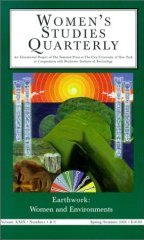 Local transformation Trough Global Connection Women assets and Evironmental Activism
Local transformation Trough Global Connection Women assets and Evironmental Activism

This volume of Women's Studies Quarterly treats the topical issue of environmental activism. As the new global economy presents ever-sharper challenges to the environment and to traditional ways of life, the work of women has proven of crucial value. Because of their role as producers, intimate with the ecosystems they grow food and raise children in, women have often been the first to detect environmental problems and have been at the forefront of reshaping the goals of development policy. This important and accessible volume surveys their contributions to finding sustainable ways of living and suggests where the battles will be drawn in the new era of biotechnology and expanding corporatization worldwide. Offering historical background to today's ecofeminism, Earthwork reveals how women have shaped environmental awareness. The issue features engaging accounts of turn-of-the-century women naturalists, the Chipko movement in India, and the grassroots activism that publicized the Love Canal disaster. The exploitation of women on both sides of the North/South divide is explored in articles from the field, including a unique narrative study that follows the common tomato as it is grown, picked, and ultimately sold in Canada by a series of women workers. In a section devoted to poetry and reflective prose, women speak directly about their experiences in nature. Their provocative voices lead into a final section that provides pedagogical springboards: syllabi and course descriptions for teaching a feminist critique of science and reintroducing students to nature's challenges. Earthwork is an excellent resource for teachers, students, and activists alike. For course use in: agricultural science, environmental science, history, political science, women's studies
|